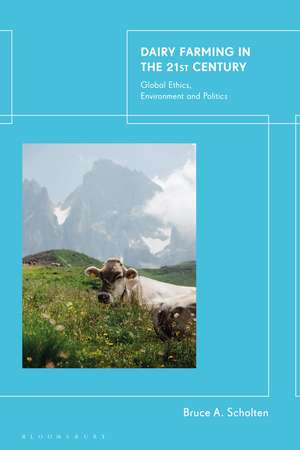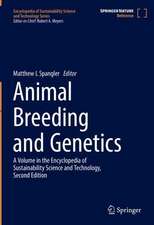Dairy Farming in the 21st Century: Global Ethics, Environment and Politics
Autor Bruce A. Scholtenen Limba Engleză Paperback – 26 iun 2024
| Toate formatele și edițiile | Preț | Express |
|---|---|---|
| Paperback (1) | 192.01 lei 6-8 săpt. | |
| Bloomsbury Publishing – 26 iun 2024 | 192.01 lei 6-8 săpt. | |
| Hardback (1) | 511.14 lei 6-8 săpt. | +110.26 lei 7-13 zile |
| Bloomsbury Publishing – 30 noi 2022 | 511.14 lei 6-8 săpt. | +110.26 lei 7-13 zile |
Preț: 192.01 lei
Preț vechi: 249.72 lei
-23% Nou
Puncte Express: 288
Preț estimativ în valută:
36.75€ • 38.22$ • 30.34£
36.75€ • 38.22$ • 30.34£
Carte tipărită la comandă
Livrare economică 12-26 aprilie
Preluare comenzi: 021 569.72.76
Specificații
ISBN-13: 9781350378612
ISBN-10: 1350378615
Pagini: 264
Ilustrații: 16 bw illus
Dimensiuni: 156 x 234 x 25 mm
Greutate: 0.37 kg
Editura: Bloomsbury Publishing
Colecția Bloomsbury Academic
Locul publicării:London, United Kingdom
ISBN-10: 1350378615
Pagini: 264
Ilustrații: 16 bw illus
Dimensiuni: 156 x 234 x 25 mm
Greutate: 0.37 kg
Editura: Bloomsbury Publishing
Colecția Bloomsbury Academic
Locul publicării:London, United Kingdom
Caracteristici
An extremely timely topic on the politics of sustainable agriculture, particularly dairy farming which, alongside the beef industry contributes to 20% of Greenhouse Gas emissions.
Notă biografică
Bruce A. Scholten has written for publications such as Hoard's Dairyman USA, VDI-Nachrichten Germany, and Governance Now India since 1988, and has belonged to the British Guild of Agricultural Journalists since 1998. He was Honorary Research Fellow at Durham University's Geography Department 2009-18. He is a Fellow of the Royal Geographical Society, and was Editor of its Rural Geography Research Group RGRG Newsletter 2009-21. He is the author of academic journal pieces including in Food Policy, Human Geography, and the International Journal of Agricultural Sustainability, and books including U.S. Organic Dairy Politics: Animals, Pasture, People, and Agribusiness (2014) and India's White Revolution: Operation Flood, Food Aid and Development (2010).
Cuprins
List of Photos and Illustrations
Glossary and Abbreviations
Foreword
Acknowledgements
Preface by author
Chapter 1 Dairying from Holocene Herding to Anthropocene Confinement
Chapter 2 Politics, Family Farmers & Animals
Chapter 3 Ethics & Animals
Chapter 4 Environment & Livestock Agriculture
Chapter 5 Women's Grass Ceiling: Nexus of Ethics, Environment, and Politics
Chapter 6 Conclusions on Cows, Climate & Humans
Bibliography
Index
Recenzii
In this volume Bruce Scholten brings together his long-standing research on dairying from around the world, making a unique and ground-breaking contribution to agri-food studies and agricultural geography. It is informed with an ambitious and critical approach to a wide range of literatures and empirical investigations. In particular, it blends ethical, political and environmental debates and perspectives, dealing with both production and consumption relations. It is a 'must read' for a wide range of scholars and practitioners interested in the conceptual and material cross-roads global dairying now finds itself.
Bruce Scholten's volume is an important contribution to the question of sustainable dairy farming. He thoroughly interrogates the ethical dimension of production, and demonstrates how ethics, the environment and political factors shape the face of the industry. The book uses evidence and fact in a rounded way and includes academic work as well as the observations of practitioners. As an aside, Scholten offers a valuable critique of how evidence is created and valued and the devaluation of expert knowledge and the subsequent costs. I particularly enjoyed his interrogation of the gendered nature of farming practice, a theme that is often overlooked when agriculture is seen as a sector rather than an occupation. This book is a delight to read; it is witty, engaging, and very clever.
As professor, researcher and mentor-cum-supervisor of university graduate students researching smallholder dairy development, including policies and climate change, over four decades, I have not come across a book that examines the political, ethical and environmental factors influencing dairy development in one volume like this. Writing on India's White Revolution, and the East Africa Dairy Development project (EADD), Bruce A. Scholten, promotes sustainability and nutrition security, showing how village cooperatives, cold chains and technical assistance can empower women's income and family nutrition. We will see if more digestible feed, and additives such as seaweed, can enhance women's participation - while reducing ruminant methane which exacerbates global warming.
This book provides extremely significant insights into environmental and social concerns related to the future of dairy farming in the Global North and South. Its engagement with key ethical debates and foregrounding of farming communities is outstanding, especially its abiding concern with animal welfare and insights into women's roles in dairy farming. Given concerns around livestock and methane emissions, Scholten's exceptionally valuable and timely perspectives will engage both a specialist audience and those more broadly interested in sustainable and just solutions to global warming and food insecurity.
In Chapter 5 Bruce Scholten highlights the importance of women farmers for international food security and sustainable development. Using the metaphor of the grass ceiling, he examines obstacles to women's success as farmers and the gendered economic disparities between men and women. Women's organizations and cooperatives, the growth of alternative food networks, organic production and organic certification policies provide the means for some women to break through the grass ceiling. Scholten explains how the Grass Ceiling differs among nations in accordance with geography, social structures and norms, government policy and consumer preferences.
'Dairy farming has become dominated by markets and investors, beyond control of family-scale farmers who get their hands dirty and break a sweat for a living. Bruce Scholten understands, both analytically from his academic background, and with his roots on the farm, that there is an intrinsic relationship between a herd of cows and a family, and between cows and cropland where their waste is recycled to enrich soil instead of becoming a concentrated pollutant. He articulates how eliminating these connections exploits people, animals and the environment, resulting in nutritionally-inferior food.
Bruce Scholten's volume is an important contribution to the question of sustainable dairy farming. He thoroughly interrogates the ethical dimension of production, and demonstrates how ethics, the environment and political factors shape the face of the industry. The book uses evidence and fact in a rounded way and includes academic work as well as the observations of practitioners. As an aside, Scholten offers a valuable critique of how evidence is created and valued and the devaluation of expert knowledge and the subsequent costs. I particularly enjoyed his interrogation of the gendered nature of farming practice, a theme that is often overlooked when agriculture is seen as a sector rather than an occupation. This book is a delight to read; it is witty, engaging, and very clever.
As professor, researcher and mentor-cum-supervisor of university graduate students researching smallholder dairy development, including policies and climate change, over four decades, I have not come across a book that examines the political, ethical and environmental factors influencing dairy development in one volume like this. Writing on India's White Revolution, and the East Africa Dairy Development project (EADD), Bruce A. Scholten, promotes sustainability and nutrition security, showing how village cooperatives, cold chains and technical assistance can empower women's income and family nutrition. We will see if more digestible feed, and additives such as seaweed, can enhance women's participation - while reducing ruminant methane which exacerbates global warming.
This book provides extremely significant insights into environmental and social concerns related to the future of dairy farming in the Global North and South. Its engagement with key ethical debates and foregrounding of farming communities is outstanding, especially its abiding concern with animal welfare and insights into women's roles in dairy farming. Given concerns around livestock and methane emissions, Scholten's exceptionally valuable and timely perspectives will engage both a specialist audience and those more broadly interested in sustainable and just solutions to global warming and food insecurity.
In Chapter 5 Bruce Scholten highlights the importance of women farmers for international food security and sustainable development. Using the metaphor of the grass ceiling, he examines obstacles to women's success as farmers and the gendered economic disparities between men and women. Women's organizations and cooperatives, the growth of alternative food networks, organic production and organic certification policies provide the means for some women to break through the grass ceiling. Scholten explains how the Grass Ceiling differs among nations in accordance with geography, social structures and norms, government policy and consumer preferences.
'Dairy farming has become dominated by markets and investors, beyond control of family-scale farmers who get their hands dirty and break a sweat for a living. Bruce Scholten understands, both analytically from his academic background, and with his roots on the farm, that there is an intrinsic relationship between a herd of cows and a family, and between cows and cropland where their waste is recycled to enrich soil instead of becoming a concentrated pollutant. He articulates how eliminating these connections exploits people, animals and the environment, resulting in nutritionally-inferior food.

